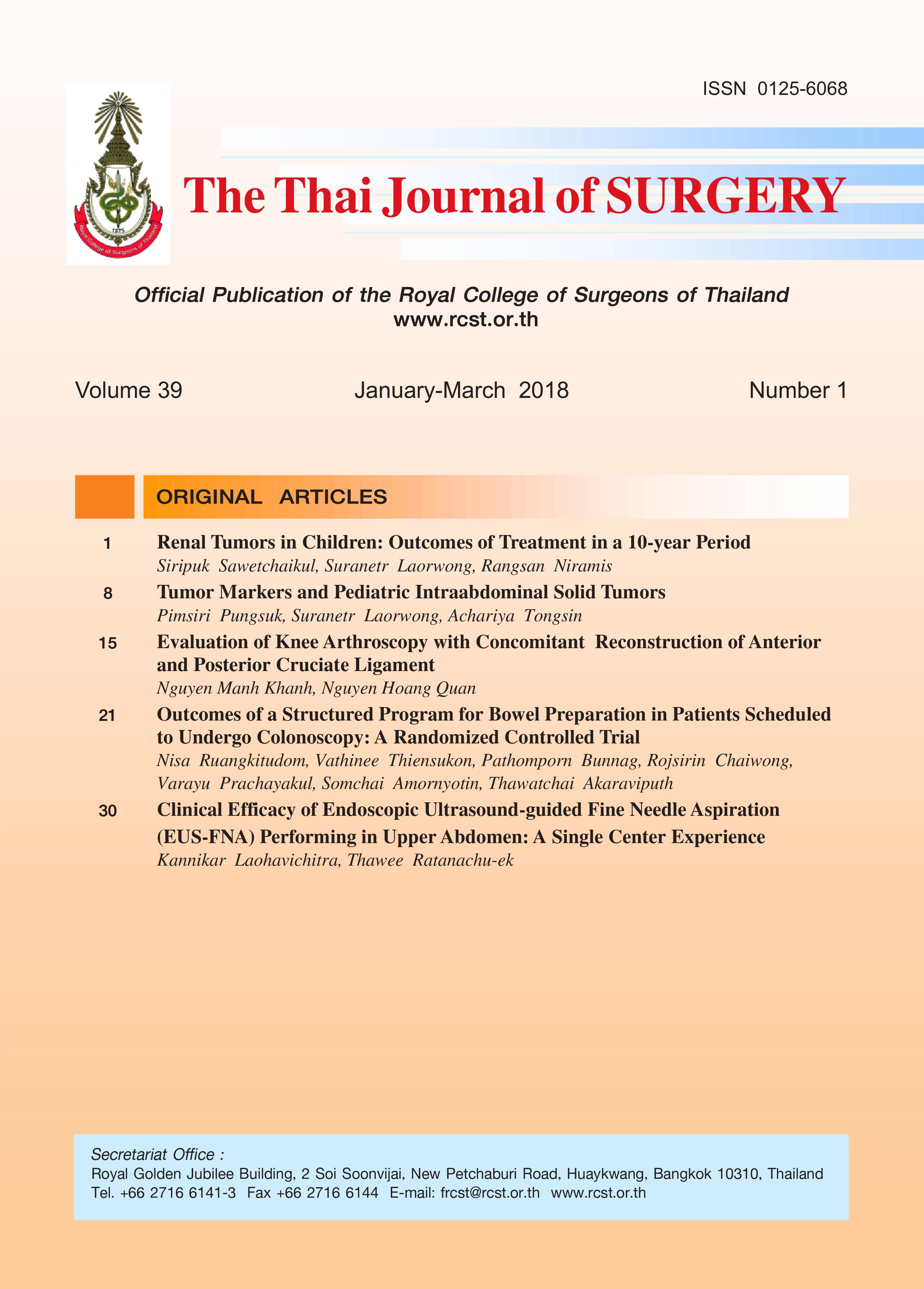Renal Tumors in Children: Outcomes of Treatment in a 10-year Period
Keywords:
Renal tumors, children, Wilms’ tumor, mesoblastic nephroma, outcomeAbstract
Background: Renal tumors are the second most common intraabdominal tumor in children and Wilms’ tumor is mostly mentioned. Other renal tumors have a small number and also have different clinical characteristics, treatment and prognosis comparing with Wilms’ tumor. Background: Renal tumors are the second most common intraabdominal tumor in children and Wilms’ tumor is mostly mentioned. Other renal tumors have a small number and also have different clinical characteristics, treatment and prognosis comparing with Wilms’ tumor
Purpose: The aim of this study was to determine characteristics and outcomes of treatment of renal tumors in children. Materials and Methods: A retrospective chart review of patients with renal tumors who were surgically treated at Queen Sirikit National Institute of Child Health from January 2006 to December 2015 was conducted. Patients’ data were collected and analyzed for demonstration of treatment outcomes of the various renal tumors.
Results: Sixty-four patients, 30 males and 34 females, were available for the study. Age at diagnosis ranged from 2 months to 14.5 years (average 3.2 years). The three most common clinical manifestations were palpable abdominal mass, hematuria and abdominal pain in 47 (73.4%), 17 (26.6%) and 12 cases (18.8%), respectively. The principal preoperative imaging was computerized tomographic scan which was done in 62 cases (96.9%). Benign and malignant renal tumors were noted in 7 (10.9%) and 57 cases (89.1%). Benign renal tumors including mesoblastic nephroma (4 cases) and others (3 cases) were treated by total nephrectomy and all of the 7 cases survived. Malignant renal tumors included Wilms’ tumor (42 cases), clear cell sarcoma (6 cases), renal cell carcinoma (5 cases) and others (4 cases). Primary nephrectomy could be done in 80% of all malignant renal tumors. Adjuvant chemotherapy and radiotherapy were used to treat malignant renal tumors. Four patients died in this study, Wilms’ tumor (2 cases), renal cell carcinoma (1 case) and mesenchymal chondrosarcoma (1 case). There was no mortality in the benign group.
Conclusion: Wilms’ tumor was the most common renal tumor in children with good prognosis. Mesoblastic nephroma was the most common benign renal tumor and had a 100% survival rate.
References
2. Ehrich PF, Shamburger RC. Wilms’ tumors. In: Coran AG, Caldamone A, Adzick NS, editors. Pediatric surgery. 7th ed. Philadelphia : Elsevier-Saunders; 2012. p. 423-40.
3. Ritchey ML, Shamburger RC. Pediatric urologic oncology: renal and adrenal. In : Wein AJ, Kavoussi LR, Partin AW, eds. Campbell-Walsh Urology. 11th ed. Philadelphia: Elsevier-Saunders; 2016. p. 3559-81.
4. Hanif G. Intra-abdominal tumors in children. J Coll Physicians Surg Pak 2004;14(8):478-80.
5. Brok J, Treger TD, Gooskens,et al. Biology and treatment of renal tumors in childhood. Eur J Cancer 2016;68:179-95.
6. Miniati D, Gay AN, Parks KV, et al. Imaging accuracy and incidence of Wilms’ and non-Wilms’ tumors in children, J Pediatr Surg 2008;43:1031-7.
7. Lowe LH, Isnuani BH, Heller RM, et al. Pediatric renal masses: Wilms tumor and beyond. Radiographics 2000;20(6):1585-603.
8. The Thai Pediatric Oncology Group. Renal tumor. National protocol for the treatment of childhood cancer 2014. Bangkok: M-Print Corporation; 2014. p. 227-44(in Thai).
9. Bernstein L, Linet M, Smith MA, et al. Renal tumors. In : Ries LAG, Smith MA, Gurney JG, et al, eds. Download a report : Cancer Incidence and Survival Among Children and Adolescents: United States SEER Program 1975-1995. Bethesda: National Cancer Institute; NIH Pub, No. 99-4649; 79-90; SEER Program.
10. Ali AN, Diaz R, Shu HK, et al. Surveillance, epidemiology and end results (SEER) comparison of adult and pediatric Wilms’ tumor. Cancer 2012;118:2541-51.
11. Ying Z, Cheung MC, Yang R, et al. Pediatric non-Wilms renal tumors: subtypes, survival and prognostic indicators. J Surg Research 2010;163:257-63.
12. Indolfi P, Terenziani M, Casale F. Renal cell carcinoma in children: a clinicopathologic study. J Clin Oncol 2003;21(3): 530-5.
13. Tomlinson GE, Breslow NE, Dome J, et al. Rhabdoid tumor of the kidney in the National Wilms’ Tumor Study: age at diagnosis as a prognostic factor. J Clin Oncol 2005;23:7641-5.
14. Kida Y, Yamaguchi K, Suzuki H, et al. Tuberous sclerosis, associated with renal cell carcinoma and angiomyolipoma, in a patient who developed end stage renal failure after nephrectomy. Experiment Nephrol 2005;9(2):179-82.
15. Lister J, Levick RK. Errors in diagnosis in Wilms’ tumor. J Pediatr Surg 1966;1(5):488-97.
16. Naprasert L. Wilms’ tumor in Queen Sirikit National Institute of Child Health. A thesis submitted in partial fulfillment of the requirement for the Diploma of the Thai Board of Pediatrics of the Medical Council of Thailand 1996.
17. Pattarakunwiwat P. Wilms’ tumor in Queen Sirikit National Institute of Child Health. A thesis submitted in partial fulfillment of the requirement for the Diploma of the Thai Board of Pediatrics of the Medical Council of Thailand 2011.
18. HamiltonTE, Shamberger RC. Wilms tumor: recent advances in clinical care and biology. Semin Pediatr Surg 2012;21:15-20.
19. Howlader N, Noone AM, Krapcho M, et al. SEER Cancer Statistics Review, 1975-2014, National Cancer Institute. Bethesda, MD, https://seer.cancer.gov/csr/1975_2014/, based on November 2016 SEER data submission, posted to the SEER website, April 2017.
20. Sanpakit K, Triwatanawong J, Sumboonnanonda A. Longterm outcome in pediatric renal tumor survivors: experience of a single center. J Pediatr Hematol/Oncol 2014;35 (8):610-3.
21. Sangkhathat S, Chotsampanvharaen T, Kayasut K, et al. Outcomes of pediatric nephroblastoma in Southern Thailand. Asian Pacific J Cancer Prev 2008;9:643-7.
Downloads
Published
How to Cite
Issue
Section
License
Articles must be contributed solely to The Thai Journal of Surgery and when published become the property of the Royal College of Surgeons of Thailand. The Royal College of Surgeons of Thailand reserves copyright on all published materials and such materials may not be reproduced in any form without the written permission.



